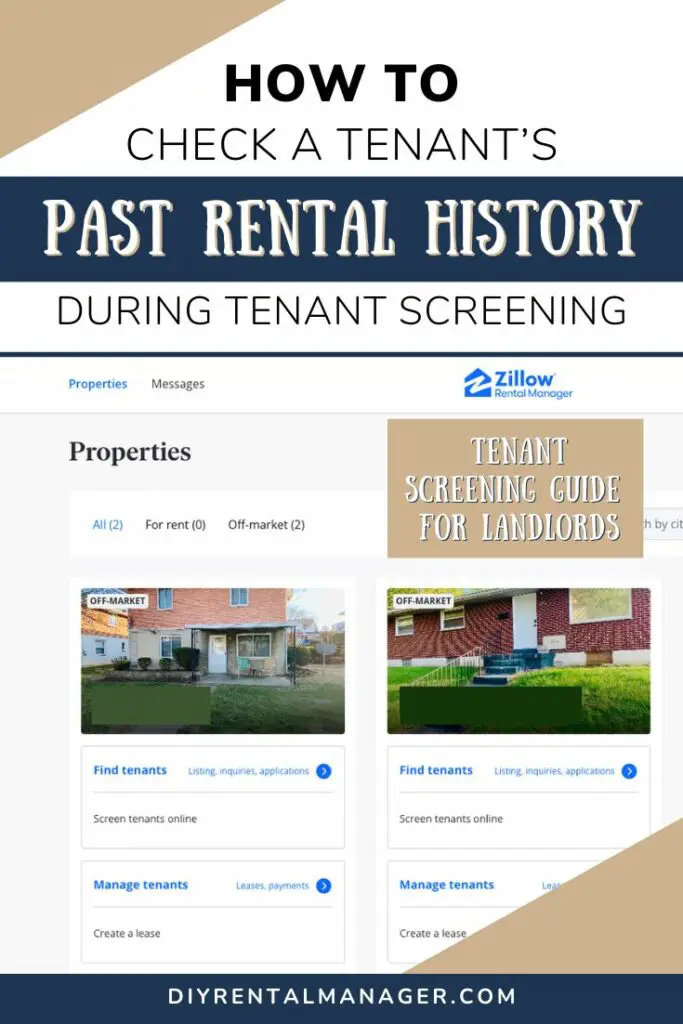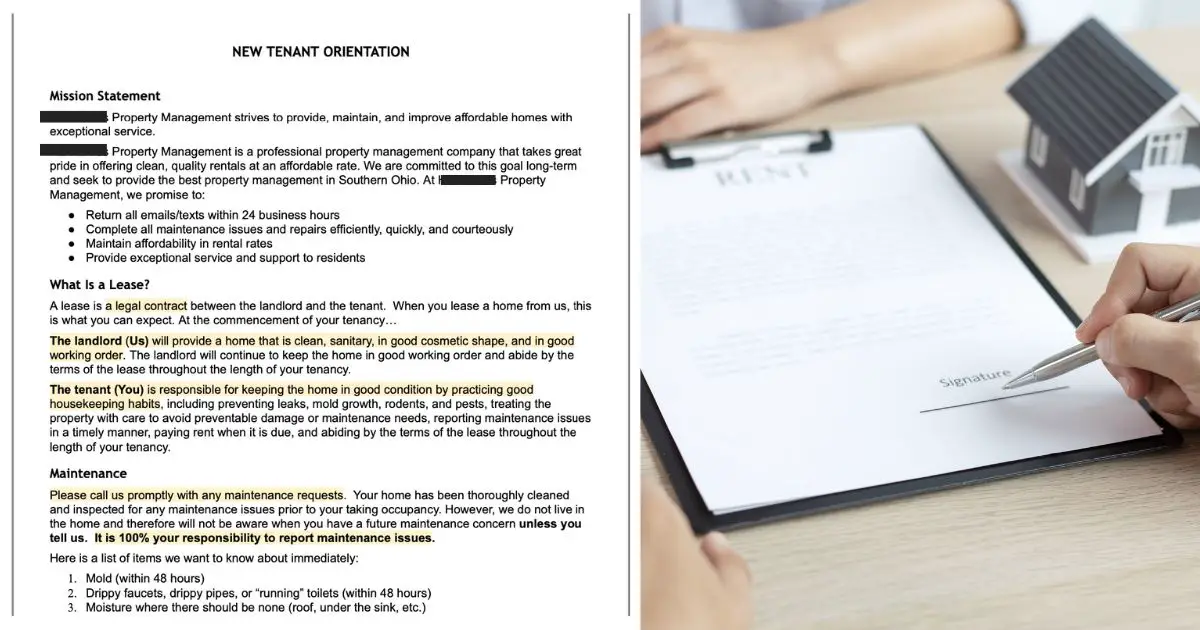Verifying a potential tenant’s past rental history is an important part of the tenant screening process.
Oftentimes, applicants want to hide any evictions on their record or don’t want you to talk to their current landlords so you can’t get information on the previous problems they’ve caused. When that happens, it can significantly increase the chances of an eviction needing to be filed.
Rental property applicants should have no evictions on their record (or none within the last 5 years at a minimum). Verifying that there are no recent evictions on their record helps decrease the chance that the tenant will result in skipping out on rent payments or force you to start the eviction process.
With those main points in mind, I’ll cover everything you need to verify an applicant’s past rental history so you can find a tenant who is more likely to treat the property right, pay on time, and not cause an eviction notice to be posted on the door below.
Let’s dive in!
Quick Navigation
- Why Landlords Should Verify Applicants Past Rental History
- Who’s Past Rental History Should Be Verified On An Application
- Rental History Red Flags To Avoid
- How To Verify Past Rental History
- Questions To Ask When Verifying Past Rental History For A Rental Property
- Be Mindful Of Fair Housing Laws While Verifying Applicants Past Rental History
- What To Do If The Applicant Does Not Pass The Past Rental History Requirements
- What To Do If The Applicant Does Pass The Past Rental History Requirements
- Final Thoughts
- Related Content
1. Why Landlords Should Verify Applicants Past Rental History
One of the scariest things that can happen when owning a rental property is having to go through an eviction. Not only are you no longer collecting rent from a tenant, but you are also paying money to get the court to allow you to remove them from the premises.
One of the best ways to minimize the chance of this scenario happening is by checking all applicants’ past rental history to verify that none of the potential tenants have any evictions on their records.
By verifying a tenant’s past rental history, we can attempt to assess a tenant’s financial stability and willingness to pay rent on time. If they don’t have any evictions on their record, then we know they haven’t tried to play the game of skipping out on rent when life gets tough in the past.
Of course, a tenant’s situation can (and likely will) change over time, so verifying past rental history is not a foolproof way to ensure you will never go through the eviction process with them. But it is one of the areas we want to check to see if they have a history of following their lease agreement.
Depending on your market, screening for zero evictions on their record might be tough. So sometimes it makes sense to screen for no evictions within the past 5 years plus positive references from all landlords within the past 5 years.
People are capable of changing, so if you don’t want to hold someone’s past against them, then you can screen their past rental history this way with decent success. Personally, we don’t want anyone who has ever “benefitted” from getting free rent for any period of time as eviction is occurring.
Because for many people who have been through the eviction process, if life gets tough again, then it’s a higher chance that they will use the eviction process as a way to delay/get out of their rent payments again. We simply don’t take the risk on those types of tenants.
2. Who’s Past Rental History Should Be Verified On An Application
When reviewing applications for your rental property, you want to look at the past rental history of all applicants over 18 years old. Their past rental history should be free and clear of evictions and they should receive positive references from all landlords within the past 5 years.
Why review all adults’ past rental history instead of an individual? Since everyone in the household over 18 years old will be responsible for the lease agreement, we don’t want any of them to think going through an eviction is “okay”.
We also don’t want anyone to be able to sneak in a person who is going to cause problems. Many times, whichever person in the house has the best credit score, background check, and rental history will be the only one to apply. If we just verified that one person’s rental history, and their boyfriend/sibling/friend who has a known history of breaking a lease moves in and convinces them to also break the lease, then we have a potentially big problem on our hands.
No this does not guarantee the applicants will never require us to post an eviction notice or start the eviction process, but it does help us find tenants who likely won’t force us to go down that rabbit hole.
Just like all of the screening requirements, we are simply trying to make the best decision about a person we can from the limited amount of information we can get on them. With past evictions, we choose not to mess around with them.
3. Rental History Red Flags To Avoid
Now that we know whose past rental history we should review, let’s discuss some red flags to avoid.
The rental history red flags you want to avoid include:
- Evictions on their record (found on their background report)
- Frequent moves (on average they are only staying at a place for less than 2 years – found on their application and credit report)
- Late payments (found out by speaking to previous landlords and on their credit report)
- Property damage (found out by speaking to previous landlords)
- Lease violations (found out by speaking to previous landlords)
The first thing we look at (and the main thing we decide whether they pass this minimum requirement or not) is whether they have an eviction on their record or not.
However, if two applicants are close, then we will include frequent moves, late payments, property damage, and lease violations in the final decision if we uncover them.
4. How To Verify Past Rental History
The best way to verify past rental history is to order a background and credit report.
Our favorite tools to use are the free rental manager tools available on Apartments.com and Zillow.com. Both platforms have partnered up with a different credit bureau that provides a (free-to-the-landlord) background and credit report for any person who applies to your rental property listing.
When the tenant pays the application fee on Zillow or Apartments.com, they are actually paying for these two reports to be sent to you.
These reports have been a game-changer for us. In the past, we would speak briefly with the potential tenant asking basic questions about why they were moving before showing them the property. Then if they liked the place, we signed a lease with them. Yep, that was it.
You can guess how many problems we’ve run across over the years by “taking a tenant’s word”. It’s honestly sad because you want to believe everything you hear, but it’s as simple as the old adage goes, “Trust but verify.”
Honestly, we’ve only truly gotten 1 crazy person from that method who went months without paying rent, claimed there was mold throughout the building (no matter how many times we had it checked to ensure it wasn’t), and then finally disappeared on us without another word. It took months for the process to finally be resolved and a ton of lost money and damage to the property.
I’m guessing her rental history report would have shown she had a history of not staying at a property for very long and we could have avoided this whole mess.
Other than that one incident, the main problem we’ve come across by not screening properly is that several of the tenants struggled to pay their rent on time. If we had received a credit and background report on them, we probably would have been able to weed them out and saved ourselves hours chasing rent. You live and you learn!
Now, we make sure we have all potential tenants submit an application where we will be sent their background and credit reports. They can’t falsify these reports because they are sent directly from the credit bureaus.
If we see any evictions on their record, then they are automatically denied based on our minimum screening standards. Otherwise, if they don’t have any evictions, then we sometimes will call their previous landlord to see how good of a reference they will give the applicant.
The main reason we don’t typically call previous landlords is because previous landlords have a high incentive to lie (or stretch the truth). For example:
- If the tenant was horrible – the previous landlord is likely to say they were a fine tenant because they have a big incentive to get the bad tenant to move out of their place without requiring an eviction
- If the tenant was fantastic – the previous landlord is likely to say they were a fine tenant because they have a big incentive to keep the great tenant
Either way, you might not be getting the full picture. But an eviction record can’t lie. So we put a heavier weight on the report than the references.
However, there is a ton of information you can glean from a conversation with a previous landlord, so it’s never a waste of time to talk to them. Let’s discuss some things you can ask a previous landlord next.
5. Questions To Ask When Verifying Past Rental History For A Rental Property
When talking to (or emailing) an applicant’s previous landlord, we ask a few basic questions. Then we let the previous landlord do the rest of the talking.
We always lead by introducing ourselves as the property managers and explaining the intent of our call, which is to verify past rental history for an applicant wanting to rent one of our properties. We also clarify that their answers will not be discussed with the applicant so they can feel comfortable speaking freely.
Some of the questions we ask previous landlords to verify past rental history for a rental property are:
- Did the applicant live at your property? (Share the address provided by the application)
- Did the applicant live at the property between these dates? (Share the dates the applicant said they lived there from their application). If not, when did they live there?
- What was the monthly rent?
- How much of the rent did the tenant normally pay?
- Did the tenant always pay rent on time? If not, how many times were they late?
- Did the tenant keep utilities on and paid in full at all times?
- Did anyone else live with the tenant(s)?
- Did the tenant(s) every receive any legal notices (late rent, noise, unauthorized occupants, notice to vacate, etc)? Please describe.
- Did the tenant have any pets?
- Did the tenant maintain the home in good condition (housekeeping, lawn, etc)? If no, please describe.
- Did the tenant give proper notice before vacating?
- Did the tenant receive their entire deposit back after vacating? If no, please explain.
- Would you rent to the tenant again?
- Additional comments from the previous landlord
- Name and number of the person you are talking to
You can call and talk to the previous landlord, or you can email this form to them and have them fill it out.
Our goal is to make sure the previous landlord has this applicant in their records, that they can confirm the tenancy information they’ve stated on their application is accurate, and that the applicant is wasn’t a problem to work with.
If the previous landlord gives us any other information (such as they are frequently late on payments/have had noise complaints filed against them, or have hidden pets in the past), then that’s icing on the cake in helping us make our decision. But we are mostly going for past rental verification because that’s a quantifiable value we can compare against other applicants.
6. Be Mindful Of Fair Housing Laws While Verifying Applicants’ Rental History
As you are verifying applicants’ past rental history, be mindful of the Fair Housing Laws.
We don’t want to discriminate based on race, religion, sex, color, national origin, familial status, or disability. Our only goal is to find the best applicant who will pay rent on time and take care of the property.
To comply with Fair Housing Laws, be sure to keep your screening standards as quantifiable as possible. Checking that nobody in the household has an eviction on their record is a quantifiable value that they either meet or they do not.
Then, if they do meet that minimum requirement, you can go one step further and compare their Move Frequency to another applicant’s Move Frequency when screening to choose the tenant with the better chance of staying longer because that is still a quantifiable number that has nothing to do with any of the discriminatory characteristics listed above.
For example, Applicant 1 has only moved 1x within the past 5 years while Applicant 2 has moved at the end of every lease they’ve signed within the past 5 years. Depending on the other screening criteria, Applicant 1 might be the better tenant to choose because they have a higher chance of staying at your rental property beyond the end of the initial lease agreement. (The longer a tenant stays, the less turnover you have, and the more money you save/make.)
The better way to screen applications is on a first-come, first-served basis (if possible). Unless you hold an open house, you’re likely only getting in 1 application at a time. As each application comes in, review it right then and there.
If the application passes all of your minimum screening requirements, then you can schedule a showing with them and move forward with the lease signing process. And if they do not, then you reach out to let them and let them know what screening requirement they fell short on.
We’ve found that this helps us minimize problems because we are reviewing each application individually instead of comparing. They either pass the minimum requirements or they do not.
7. What To Do If The Applicant Does Not Pass The Past Rental History Requirements
Now that you’ve reviewed the applicant’s eviction record (which probably took you all of 2 seconds), it’s time to decide if they meet this requirement or not.
If there is an eviction, then the application fails (regardless of the other screening requirements) and a Tenant Application Decline/Adverse Action Notice Letter must be sent explaining what they failed on.
We never give a pass on the eviction requirement on an application because we strongly believe a past eviction has a higher chance of a future eviction occurring. We let other landlords take the risk on them.
8. What To Do If The Applicant Does Pass The Past Rental History Requirements
If the applicant’s household has no evictions on their record(s), then we check to see if they meet the other minimum screening requirements (credit check, background check, income and employment check). If they do, then we schedule a showing with them, otherwise, we send them an Adverse Action Notice Letter explaining what they failed on.
Final Thoughts
That’s it! By now, you have a great idea of how to verify an applicant’s past rental history for a rental property. Now, all that’s left to do is review their credit history, background report, and income/employment!
We’ve found that by verifying that an applicant has no evictions on their record along with our other screening requirements, we get tenants that pay reliably so we don’t have to post eviction notices on their door. This ultimately helps us run our rentals smoothly for only 5-10 hours a month.
I hope you find this article useful and that it helps attract tenants who would love to live in your rental home!
Catch you in my next post!
Related Content
Check out my recommended tools, templates, and resources to free up your time from constantly working on and worrying about your rental properties. My husband and I use these tools to self-manage 18 rental units (and counting) for only 5-10 hours a month.
Keep in mind that most of these items are either free or reasonably priced for the amount of value that they provide. My goal on this page is to recommend tools, templates, and resources that we use daily and wish we had known about at the beginning of our landlord journey. Since implementing them, they’ve saved us countless hours and tons of headaches.
Finding good tenants for a rental property is arguably one of the most essential tasks that a self-managing landlord must accomplish. You’re searching for a high-quality tenant that will pay on time, take care of the property, and be easy to communicate with all while trying to get the most amount of rent and filling the vacant unit as quickly as possible.
That’s no small feat! So, how can you find good tenants for your rental property?


By Christine
Christine is a blogger and real estate investor/property manager who self-manages 18 rental units (and counting) alongside her husband, Adam. Although she successfully automates the management of her rentals and pockets the property management fee now, her path to success was not easy.
Go here to read her story, “From An Overwhelmed First-Time Landlord To A Pro Investor Self-Managing 18 Rentals On Less Than 10 Hours Per Month“.
Recent Posts
How To Reject A Tenant Application (With Examples!)
When you start to accept applications for your rental property, you’ll inevitably get some applications that do not meet your minimum screening standards (even if you list them in the listing, some people just don’t read or don’t care). When this happens, you’ll have to carefully review the application and send back a Tenant Application…
How To Write A New Tenant Welcome Letter For Your Rental Property
When we have found a new tenant that we are ready to sign a lease with, we want to start the new relationship off on the best terms possible. In order to do that, we need to ensure that they are familiar with the most important details of the lease. We do this by providing…
Ultimate Guide To Collecting Rent And Charging Late Fees As A Landlord (Easy System!)
Collecting rent from tenants is one of the most time-consuming (and emotionally charged) parts of being a landlord. Not only will you get every excuse under the sun about why rent will be late this month (again), but you will also miss out on opportunities to collect extra income and increase rent over time if…





